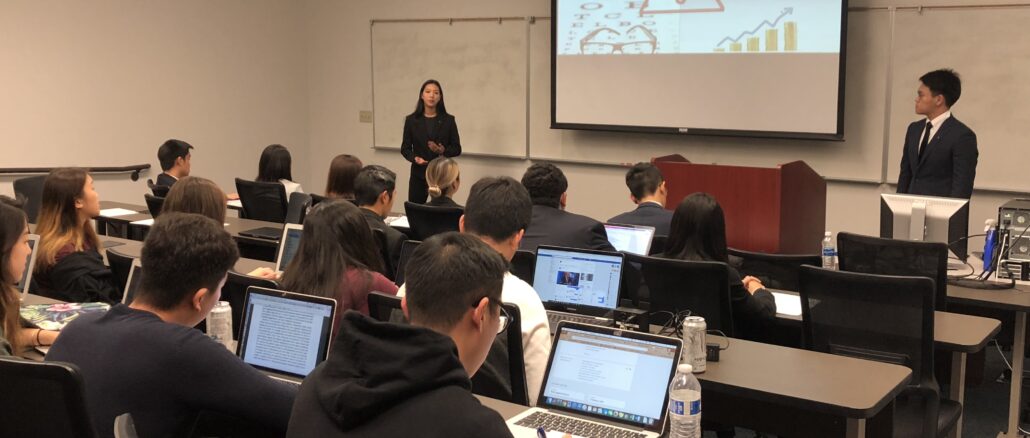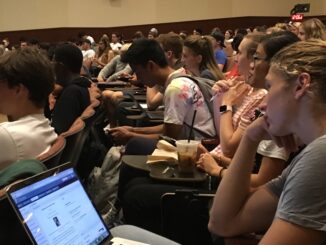
International students come from all around the world to receive a college education from Pepperdine but face language barriers that challenge them academically and socially.
International students at Pepperdine comprise about 11 percent of the student body, according to Pepperdine’s website. International students face everyday challenges include speaking in public, participating in class, writing papers, socializing and adapting to a new culture and educational system. These challenges are mostly due to the fact that English is not their first language.
“It’s not that they (international students) don’t have the competency, they are the best of the best we are recruiting and enrolling here,” said Brooke Cutler, director of the Office of International Student Services. “But it’s that translation into the American context that can create stumbling blocks and delay their success.”
The difficulties international students encounter can create anxiety and keep them from asking for help. Pepperdine has implemented some resources to help students succeed academically but few international students take advantages of these resources.
Translation time
A Pepp Post poll of 50 international students found that about 88 percent of them believe they face difficulties academically because of their language barriers.
“Sometimes it has to do with the fact that they are having to do the same work that all the other students are doing but translating in English every single thing they are hearing, and having to input and output all that is happening in a different language, which at the level of rigour at Pepperdine is intense,” Cutler said.
Some non-native speakers said it usually takes them twice as much time to process information or get assignments done in English because they are constantly translating into their native tongue and back to English.
“My brain always starts to think in Spanish and I waste time to translate it in English,” said Fernanda Alvarez, a junior communication major from Mexico. “I do believe that language barrier affects our performance academic wise and doesn’t show our real knowledge or performance because English gets in the way of everything.”
Roy Galdamez, a senior business administration major from El Salvador, said trying to translate directly from his own language leads him to use English incorrectly.
Vocabulary is something that international students from all over the world struggle with greatly.
“It happens that I don’t understand the meaning of some words and it actually decreases my efficiency and makes me put a lot more effort to produce a good piece,” said Elena Luo, a sophomore integrated marketing communication major from China.
Difficulties in the classroom setting
Students said they experience difficulties in understanding lectures and class instructions and giving presentations.
“I always struggle with some vocabulary I don’t know,” said Krystal Chen, sophomore communication and psychology major from China. “And when I give presentations, I need to prepare for so long and practice pronouncing words using a dictionary because I don’t want people to laugh at me because of my English.”
Some international students have higher anxiety levels when asked to speak in public because they are scared to mispronounce a word or portray their accent.
“I have a lot of anxiety because I know my accent is different,” said Dania Ashraf, a sophomore economics and computer science major from Pakistan.
And this seems to greatly affect their performance in class participation.
Public speaking can be nerve-wracking for a lot of people but it adds even more pressure to those who aren’t confident enough about the language they are required to speak in.
“I really think about my answers before raising my hand in class,” Luo said.
International students also seem to struggle more in particular classes.
“It’s not really math classes because it is the same everywhere,” Galdamez said. “But it’s mostly GEs, like humanities and religion, where we don’t know what some words mean. I think those classes are harder for us.”
Sometimes it also just has to do with the transition to U.S. higher education that can be a big challenge for international students.
“We have students that are from schools all around the world that are very competent, but it is just about learning how to do it in the American way that is acceptable to American professors,” Cutler said.
Through the poll, international students expressed their thoughts on what else could be done to help them succeed academically. Most of them emphasized wanting to get help adapting to the American system, have more clubs, organizations, or centers for them, or even have professors go through training to better accommodate international students.
Adapting to the American classroom environment
A lot of international students come from schools that do not follow the American educational system and as a result they are used to very different classroom environments.
“The classroom itself is a different culture,” said Jennifer Akamine Phillips, intercultural communication and speech professor. “I think that there is a level of cultural competency that we are still learning and it’s difficult if the professor isn’t quite sure of how to navigate another person’s cultural identity or their needs and expectations in an academic setting.”
Phillips said it is fundamental for professors to understand how to help and support international students by having a different approach and adapt their teaching style to their needs.
Phillips said professors might need to approach the students to see if they need extra help first rather than expecting the students to approach them because it might work this way in the culture of some students, especially eastern international students.
Chinese students comprise the largest percentage of international students at Pepperdine: 35 percent, according to Pepperdine’s website. Phillips said Chinese students are not expected to be as vocal in their classrooms and rely much more on non-verbals.
Finding ways for students and professors to adjust between different “class cultures” is therefore important to maximize success and avoid miscommunication.
Pepperdine resources
The poll and interviews with nine international students indicated that most of them are not utilizing the resources available to them despite academic difficulties.
The poll found that about 48 percent of students surveyed never use the Writing Center or the Student Success Center.
“I think there are a lot of programs for international students for support and to engage more in the university but I feel like most of us are reluctant to go,” Chen said. “I don’t know why, but maybe we are just too shy to go.”
Beyond the negative stigma associated with receiving help, students might also not know about these resources.
“I do think that awareness about our support services is a problem,” Cutler said.
Galdamez said he often goes to his friends first instead of going to the Writing Center, which helps students develop their writing skills.
“And I have never heard of the Student Success Center,” he added.
All services from the Student Success Center are free for every Seaver student, said Caitlyn Scheckel, assistant director of the Student Success Center. These include tutoring, one-on-one academic coaching and academic skills workshops once a month on topics such as time management, study skills and test preparation.
Students can drop in at any point in time during tutoring hours, as there is no need for scheduling appointments. There are about 50 tutors available who are all faculty-recommended and have already taken the courses that are offered for tutoring.
The Student Success Center recently implemented a new resource for international students specifically to help them navigate through their language barriers.
“We started English language conversation groups to allow them to be in a comfortable space where they can practice their conversation skills,” Scheckel said.
Scheckel said the hope is for international students to build confidence and take the skills they are learning to apply them in the classroom and in social settings.
Social struggles The poll found that about 88 percent of students believe they are facing more difficulties adapting in social situations because of their language barriers.
“Sometimes I don’t get those American jokes,” Chen said. “I just laugh along with them even if I don’t get it.”
Language barriers can greatly impact relationships.
“Sometimes you stop saying what you think because you just don’t know how to say it,” Galdamez said. “And that’s something that affects friendships and leads to miscommunication because you want to communicate something and you’re just not able to.”
But being international is not all negative.
While some students said being international is challenging, some view it as an advantage.
“Socially it’s amazing because you have a different cultural view and perspective of things and life,” Alvarez said.
Physical and psychological impacts on students
The process of constantly translating leads to exhaustion and affects psychological adjustments.
“I do think that a lot of our international students are experiencing far more physical, emotional, mental exhaustion than the average student on campus who may not have that same cultural and language barrier,” Phillips said.
Language barriers can also lower students’ confidence and not show their real intellectual capacity.
“You kind of feel a sense of shame when you can’t speak what is in your head, so it is kind of embarrassing to talk to faculty because you are fumbling over your words and you don’t want them to think that that is your level of intelligence because it doesn’t match your capacity in your brain,” Cutler said. “I think that is what a lot of our students struggle with.”
Phillips said it can be really frustrating for international students who might struggle with language.
“They so badly want to be heard and be able to communicate effectively, and they understand what is going on and what they want to say but it’s hard to find the actual vocabulary or the language to communicate it in a way that is understood by everybody else,” Phillips added.
Rebekah Hays, a media production major from Portland, Oregon who has international friends, shared ways to help them feel more included and supported academically and socially.
“I think reaching out to them in classes when you see that they are staying in the back with their other international friends and not participating is a good way,” Hays said. “And to make an effort to talk to them and get to know them and make them feel like they have a place on this campus. We should always offer them help and support in classes.”
Julia Strouk completed the reporting for this story under the supervision of Dr. Christina Littlefield and Dr. Theresa de los Santos in Jour 241 in fall 2018. Dr. Littlefield supervised the web story.




